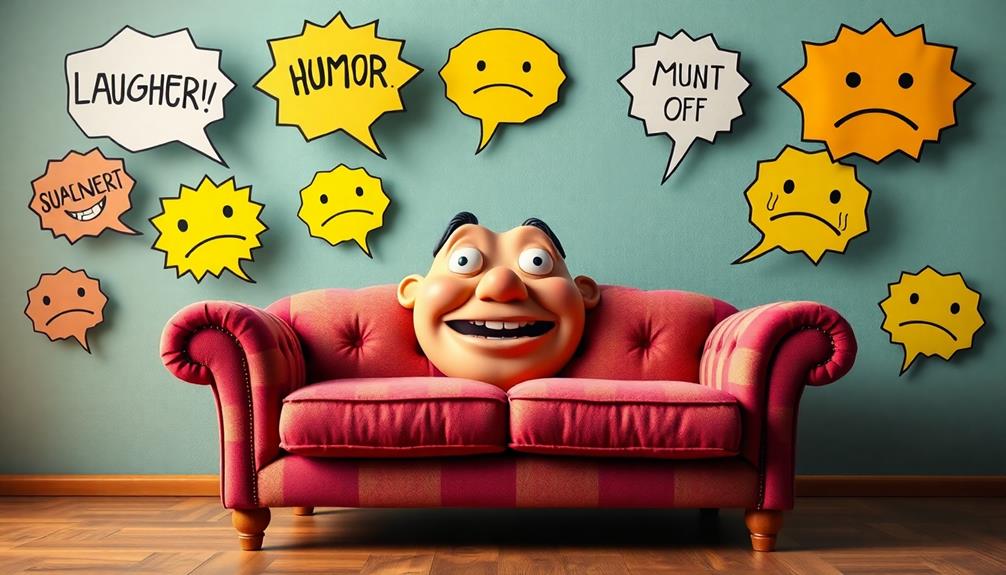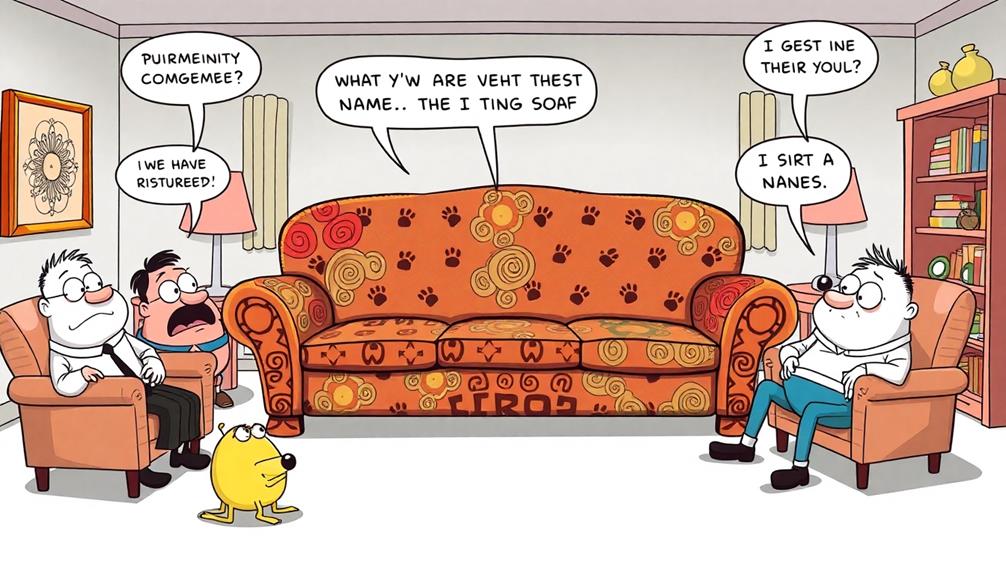The phrase "Sofa King" walks a fine line between humor and insult. It's a playful pun that sounds like "so fucking," which adds a shock factor. In casual settings, it often elicits laughs, but in professional environments, it can come across as crude. Your audience's background and the context are significant in determining whether it's funny or offensive. Misinterpretations can happen, reinforcing stereotypes or causing discomfort. So, next time you use it, consider where you are and who's around. You might find there's more to this phrase than meets the eye!
Key Takeaways
- "Sofa King" is a pun that blends humor and shock, often eliciting laughter in casual settings.
- Cultural context significantly influences whether the phrase is perceived as humorous or offensive.
- In professional environments, the phrase is generally deemed inappropriate, highlighting the need for sensitivity.
- Audience reactions are crucial; playful intent may be misinterpreted as disrespectful in different contexts.
- Mindful language choices can foster inclusivity and reduce potential misunderstandings regarding humor.
Origin of the Phrase

The phrase "Sofa King" originated as a clever pun that plays on the phonetic similarity to "so fucking." It gained popularity in the early 2000s, especially through internet memes and forums, catching attention for its humor and shock value.
This wordplay was particularly tied to a British furniture store's advertising campaign, which cleverly used the slogan "Where the prices are Sofa King low."
The phrase's rise can be attributed to its catchy nature and the thrill of subverting language norms. As memes spread, you found it popping up in conversations, often eliciting laughter.
The combination of shock and humor made it memorable, turning a simple phrase into a cultural touchstone that reflects the playful side of language.
Cultural Context and Nuances

Cultural contexts considerably shape how people perceive the phrase "Sofa King," affecting its reception across different backgrounds. For some, it's a clever pun that sparks laughter, while for others, it carries a more offensive undertone.
Understanding these nuances is vital when using the phrase.
- Linguistic Nuances: The phrase's double entendre can be interpreted differently based on cultural backgrounds.
- Acceptability: What's humorous in casual settings might be deemed inappropriate in professional environments.
- Historical Context: Shifting societal norms play a significant role in how this phrase is perceived over time.
Being aware of these factors can help you navigate conversations and avoid misunderstandings, ensuring your language is received as intended.
Humor vs. Offensiveness

Steering the line between humor and offensiveness can be tricky, especially with phrases like "Sofa King." While it might elicit laughter for some, others may find it disrespectful or crude.
You might appreciate the clever wordplay, enjoying the pun's playful nature, especially in casual settings. However, in more formal environments, it can come off as unprofessional, potentially alienating those who don't share your sense of humor.
It's crucial to gauge your audience's reactions, as context plays a significant role in how this phrase is received. Ultimately, what sparks joy for you could cause discomfort for someone else, highlighting the importance of being mindful of language's impact on others.
Balancing humor with sensitivity is key.
Social Implications of Usage

Using phrases like "Sofa King" in conversation can lead to a range of social implications that you mightn't initially consider.
While it seems humorous, the potential for misunderstanding is significant. People may react differently based on their backgrounds and beliefs. Here are a few considerations:
- Context Matters: In casual settings, it might spark laughter, but in professional environments, it can be deemed unprofessional.
- Cultural Sensitivity: Some cultures might find it offensive, while others may see it as harmless fun.
- Perception of Intent: Your intention might be playful, but others could interpret it as crude or disrespectful.
Being mindful of these factors can help you navigate social situations more effectively and avoid unintended discomfort.
Language and Communication Impact

Language profoundly shapes how we communicate and connect with others, influencing both our relationships and societal norms.
When you use phrases like "sofa king," you tap into humor that can either unite or divide. This wordplay highlights the importance of context; in casual settings, it might spark laughter, but in professional environments, it can seem inappropriate. The key lies in understanding your audience and the setting, as context determines whether wordplay enhances connection or inadvertently offends. Just as a well-timed pun can transform a conversation, attention to detail can transform your cake table from ordinary to extraordinary, elevating any celebration. By recognizing when to lean into creativity and when to exercise restraint, you ensure your message resonates effectively.
You've got to reflect on your audience and the potential for misunderstanding. Sensitivity in language fosters inclusivity, helping everyone feel respected.
By being aware of how words can perpetuate stereotypes or power imbalances, you can navigate social interactions more effectively.
Ultimately, the language you choose impacts not just the immediate conversation but also broader societal perceptions.
Misinterpretations and Stereotypes

Misinterpretations of phrases like "sofa king" often stem from their phonetic similarities to profanity, leading to confusion and discomfort. You might find that the phrase can evoke mixed reactions due to its cheeky nature, but it can also perpetuate stereotypes.
This ambiguity can result in misunderstandings, especially in diverse settings.
Consider these points:
- Some people might interpret it as a harmless joke, while others find it offensive.
- Context matters; usage in casual conversations differs vastly from professional environments.
- Misinterpretations can reinforce negative stereotypes or biases, impacting social dynamics.
Being aware of these potential pitfalls can help you navigate conversations more thoughtfully and avoid unnecessary discomfort.
Responsible Language Practices

Effective communication hinges on the words you choose, making responsible language practices essential in any interaction.
You've got to be aware of how your language can impact others. Using phrases like "Sofa King" might seem funny in casual settings, but they can easily offend someone else.
Always consider your audience and the context before you speak. Misinterpretations can lead to discomfort, and what's humorous to one person may be disrespectful to another.
Aim for clarity and sensitivity in your language; it fosters respect and understanding. By being mindful of your word choices, you create an inclusive environment where everyone feels valued.
Frequently Asked Questions
What Are Some Popular Memes Featuring "Sofa King"?
You might remember memes showcasing "sofa king" with humorous images of furniture or exaggerated discounts. They cleverly blend wordplay and visual humor, often shared in online forums, making you chuckle or shake your head.
How Has "Sofa King" Influenced Modern Slang?
You've likely noticed how "sofa king" shaped modern slang, blending humor and shock value. Its clever wordplay makes it memorable, allowing you to use it casually in conversations, though context matters to avoid misunderstandings.
Are There Any Famous Quotes Using "Sofa King"?
You might not find famous quotes specifically using "sofa king," but its playful wordplay often pops up in memes and casual conversations. It's all about context and how you choose to use it!
Can "Sofa King" Be Used in Marketing Strategies?
Studies show that puns increase engagement by 30% in advertising. You can definitely use "sofa king" in marketing strategies, leveraging its humor and wordplay to capture attention and create memorable brand associations among consumers.
What Are Some Alternatives to "Sofa King"?
If you're looking for alternatives to "sofa king," consider phrases like "incredibly affordable," "super low prices," or "unbeatable deals." These options convey excitement without the potential for misunderstanding or offense in various contexts.
Conclusion
In the end, the phrase "Sofa King" dances on the edge of humor and offense, much like a tightrope walker balancing high above. While it can spark laughter among friends, it might also ruffle feathers in more serious settings. So, as you navigate conversations, keep this playful expression in your pocket, using it wisely to guarantee your words bring joy rather than discomfort. After all, a well-timed chuckle can light up a room, but sensitivity keeps the peace.









